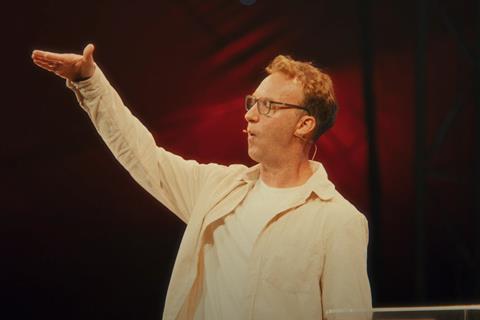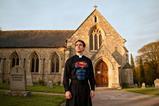Amid the spiritual highs of a Christian festival, Rev Jamie Sewell found himself unexpectedly drawn instead to the perhaps forgotten staple of Christian community. In our pursuit of mountaintop moments, he asks, have we lost sight of our real calling — journeying together through the everyday

For years, I’ve seen Christian festivals like Focus as mountaintop moments, those precious spiritual highs where we step out of the everyday and hear from God in a fresh way.
I’ve always loved that about them. And this year, it felt like something even more special: I had the privilege of taking four families from our church along with me. It was a huge milestone after two years of slow, often challenging, community-building in a busy London parish.
But something unexpected happened. I didn’t just find God in the main meetings or the times of worship. I found him while helping a family fix their leaking tent. I saw him around the campfire while we laughed at our kids’ antics. I saw him when we huddled together in the cold, sharing blankets, jokes, and hot chocolate. It was joyful, yes, but it was also real.
And it got me thinking: have we become so focused on mountaintop moments that we’ve forgotten the formation that happens in the everyday desert?
Community is constant
When you look at the lives of the great figures in scripture, you see a striking pattern. The mountain moments are there, yes, but they are fleeting.
- Moses encounters God at the burning bush (Exodus 3), and later receives the Ten Commandments on Mount Sinai (Exodus 19). But he spends decades in the wilderness, leading a messy, rebellious people and learning to trust God in the long, slow journey.
- Elijah doesn’t hear God in the storm or fire on Mount Horeb, but in the gentle whisper (1 Kings 19). He then returns to face the daily grind of prophetic ministry, including mentoring Elisha and confronting injustice.
- Jesus withdrew to the mountain often to pray (Luke 6:12; Matthew 14:23), but the majority of his life and ministry happened on the road, at tables, in boats, on footpaths, among crowds, and in a tight-knit community of disciples who constantly misunderstood him. His discipleship of them wasn’t through sermons alone, it was through walking with them, correcting them, eating with them, laughing with them.
If you measured verse by verse in the gospels, the mountains get just a few paragraphs. The meals, the travels, the frustrations and friendships, that’s where the bulk of the story happens.
So why do we shape our church life around moments of elevation, instead of rhythms of presence?
When leading becomes curating the mountain
As a vicar, I’ve often felt the pressure, sometimes unspoken, sometimes very vocal, to deliver spiritual moments that move people.
The most meaningful Eucharist. The most powerful sermon. The most inspiring prayer night. The best-planned retreat, Alpha course or community event.
And these things matter. But I’ve started to wonder: if all I do is facilitate moment after moment, event after event, mountaintop after mountaintop… but I’m not sitting at a dinner table with the people I lead… if I’m not in their homes or they’re not in mine… if I’m not journeying with them in the everyday, then I’m not fulfilling my role as a priest.
I’m just a holy event planner.
The priestly calling in the Church of England includes, “gathering God’s people, preaching the word, and faithfully ministering the sacraments”, but also, crucially, pastoral care, presence, and the cure of souls. It’s not just about holding services. It’s about holding lives.
The Church in Acts
I keep returning to that beautiful picture in Acts 2, right after the Holy Spirit comes at Pentecost. It’s not just a story of explosive power or miraculous signs, it’s a story of how the early church actually lived.
“They devoted themselves to the apostles’ teaching and to fellowship, to the breaking of bread and to prayer… All the believers were together and had everything in common… Every day they continued to meet together in the temple courts. They broke bread in their homes and ate together with glad and sincere hearts…” (Acts 2:42–46)
Yes, they gathered at the temple. Yes, they worshipped. But that wasn’t the whole picture. Their discipleship was grounded in a rhythm of togetherness, in homes, around tables, through conversation, through teaching, prayer and shared meals.
And I wonder, how much of that rhythm have we lost?
Maybe the goal isn’t to lead people to one mountaintop after another. Maybe the call is to walk with them through the desert.
In many churches today (mine included), Sundays can become the main, sometimes the only, point of connection. And while our Sunday gatherings matter deeply, they can start to feel like miniature mountaintop moments: people turn up in their Sunday best, hoping for a spiritual lift before disappearing again into the week.
But you don’t build deep community by gathering once a week and hoping for a good service. You build it by eating together, sharing in the apostles’ teaching together, praying together, laughing, helping each other fix broken furniture or wrestle with questions about faith or parenting or grief.
That’s what struck me so powerfully at Focus. It wasn’t just the sessions or worship tents. It was watching people from my church share porridge in the morning, help each other put their kids to bed at night, sit on camping chairs with a cup of tea and no real agenda.
And it made me long for that to be normal church life, not the exception.
Maybe the desert is the point
I remember after the first night at Focus, one of the mums from our group, a brilliant, kind woman with two gorgeous kids, was clearly struggling. She hadn’t slept. Her children were buzzing with energy, but she looked broken from the night before. I could see in her eyes that she was already regretting her decision to come.
I had with me a secret weapon when it comes to camping: a glorious, thick roll-out mattress, better than any camping mattress I’ve ever used. Years of youth work and hundreds of camping trips had taught me how painful it is to lead tired, grumpy, and with an aching back due to having an air bed that slowly deflated throughout the night. So I’d brought the best.
I looked at her, I felt that small, unmistakable whisper: “Jamie… Give her the mattress.”
I didn’t want to. I was tired too. I knew what a difference it made to my own experience. But I also knew, deep down, that this is what the Christian life is. Sharing what you have. Listening to the whisper. Bearing one another’s burdens, even if it means bearing a bit more discomfort yourself.
And with that I found myself on a slowly deflating inflatable mattress for the remainder of the camp.
That mattress, oddly enough, became a kind of icon for me. A symbol of what we’re really called to do, not just provide spiritual moments, but make space for others to rest, even if it comes with a personal cost.
Because church isn’t supposed to be a performance on a Sunday, it’s supposed to be a people who live, pray, struggle, and rejoice together. So maybe the goal isn’t to lead people to one mountaintop after another. Maybe the call is to walk with them through the desert.
To pitch our tents together. To light the fire. To break the bread. To give up the comfortable mattress. And to trust that God is just as present there.






































No comments yet